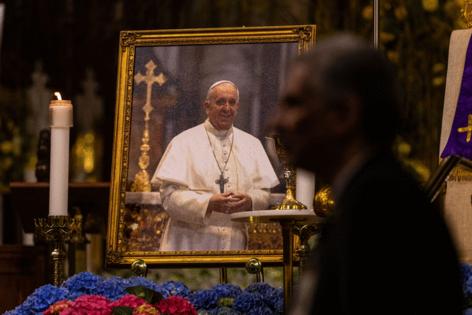Editorial: Pope Francis' legacy of mercy and compassion is instructive for us all
Published in Op Eds
As Jorge Mario Bergoglio prepared to assume the papacy, he chose a new name: Francis.
That choice was a tribute to St. Francis of Assisi and set the stage for Pope Francis’ entire pontificate, in which he showed ceaseless solidarity with the poor and voiceless, just like his namesake. The pontiff set himself apart from all of his predecessors, as he was the first to go by this new name.
Francis died Monday morning at the age of 88.
As the head of the church, Francis’ leadership was critical in maintaining the faith’s relevance and importance. In a world where people increasingly are less likely to attend church, they still listened attentively to the pope’s message. Among his most remembered quotes is a call for compassion: “A little mercy makes the world less cold and more just.”
Indeed, compassion was one of Francis’ core tenets. So was unity.
“Let us dream, then, as a single human family, as fellow travelers sharing the same flesh, as children of the same earth which is our common home, each of us bringing the richness of his or her beliefs and convictions, each of us with his or her own voice, brothers and sisters all,” he said.
Among Francis’ favorite passages of Scripture were verses that reflected his deep commitment to mercy, humility and service, as well as his desire for a Catholic Church that is open, compassionate and welcoming to everyone, particularly those on the margins of society. These passages also reinforced his vision of a more inclusive and loving church, one that follows the example set by Jesus in the Gospels. He frequently summoned the image of the Good Samaritan parable to remind those of faith that kindness is not reserved only for people who look, think or act like each other. He also emphasized the godliness of mercy and generosity to the poor and needy in his homilies, referencing verses such as Matthew 25:40, in which Jesus tells his disciples, “Truly I tell you that, just as you did it to one of the least of these my brothers, you did it to me.”
He underscored Jesus’ teaching that true greatness in the kingdom of God is not measured by power or status, but by humility and service. Francis frequently emphasized the role of leadership in the church as one of service, and he called on the clergy to follow Christ’s example by serving others, especially the poor and the marginalized. He called upon all church leaders to become shepherds who smell like their sheep. Francis was known to ride public transportation and interact with ordinary people and also opted to live in the Domus Sanctae Marthae, a guesthouse within Vatican City, instead of the grander papal apartments in the Apostolic Palace.
Bishop Thomas John Paprocki of the Springfield Diocese had the chance to meet the Holy Father in 2019 in Vatican City. Paprocki said he was struck by Francis’ joy and reflected that the pope spoke to Paprocki and the other bishops with him not as a boss, but as a fellow apostle tasked with the same mission all priests have — to passionately advance their faith.
“As I look back on his pontificate, one of the most powerful scenes I have witnessed occurred in 2020 during the height of the COVID-19 pandemic,” Paprocki told the Tribune. “In Vatican City, against a backdrop of St. Peter’s Basilica, heavy rain, darkening skies, and not a soul around, Pope Francis prayed for the world, holding up the Blessed Sacrament during his ‘Urbi et Orbi’ (To the City and the World) blessing. Pope Francis taught us in that powerful moment that amongst all the trials, fear, uncertainty, stresses, violence, and hatred in this world, we must always turn to God, praying with a heart full of love and hope, saying, ‘Jesus, I trust in You.’”
Though he was not partisan, his positions often appealed to progressives, giving moral authority on issues such as inequality, critiques of corrupted capitalism and the need for all people to be good stewards of the earth. Some critics took issue with what they perceived as the pope’s left-leaning ideology, calling him “the woke pope.”
But where partisans often employ elements of faith and Christian values for personal or political gain, the pope’s message was based on his deep faith and biblical principles. Other popes have also seen their leadership and public positions on key global issues often have political ramifications. Pope John Paul II was known for his work opposing authoritarianism, and he played a significant role in ending communism in Poland and other parts of Eastern Europe.
With the late pontiff’s passing, the world now awaits news of who will succeed Francis. And as we wait, let us remember his legacy of mercy and compassion and his desire that we love one another, regardless of our differences.
___
©2025 Chicago Tribune. Visit at chicagotribune.com. Distributed by Tribune Content Agency, LLC.




























































Comments